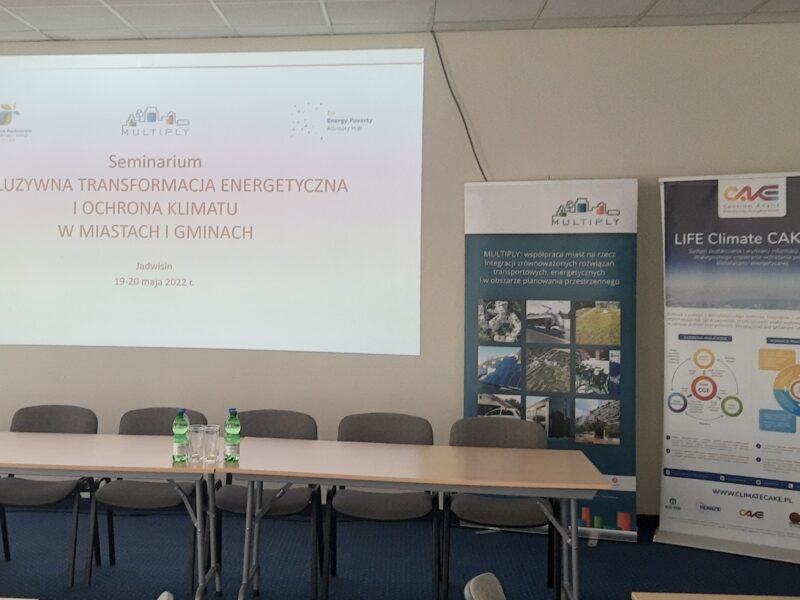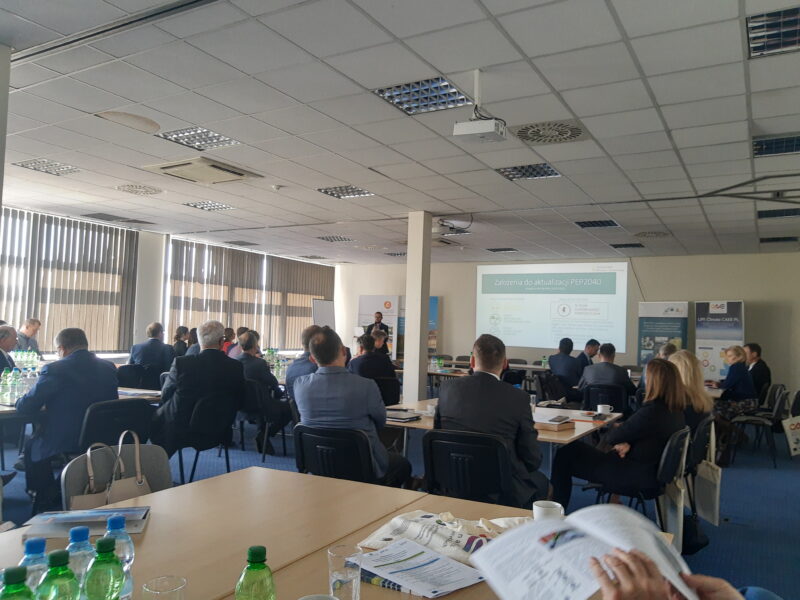CAKE at the seminar in Jasdwisin
On 19-20 May 2022, the CAKE team participated in the conference “Inclusive energy transformation and climate protection in cities and municipalities”, organized by the Association of Municipalities Polish Network “Energie Cités”. During the two-day meeting, participants and representatives of over 60 cities and municipalities had the opportunity to both present and exchange experiences in the field of planning the development of its in the context of the challenges of the energy transformation. CAKE representatives had the opportunity to present and share the publication which is one of the main results of the LIFE Climate CAKE PL project – “Polska net – zero 2050. Podręcznik Transformacji Energetycznej dla Samorządów” [“Poland net zero 2050.. Energy transition manual for local governments.”- in Polish].
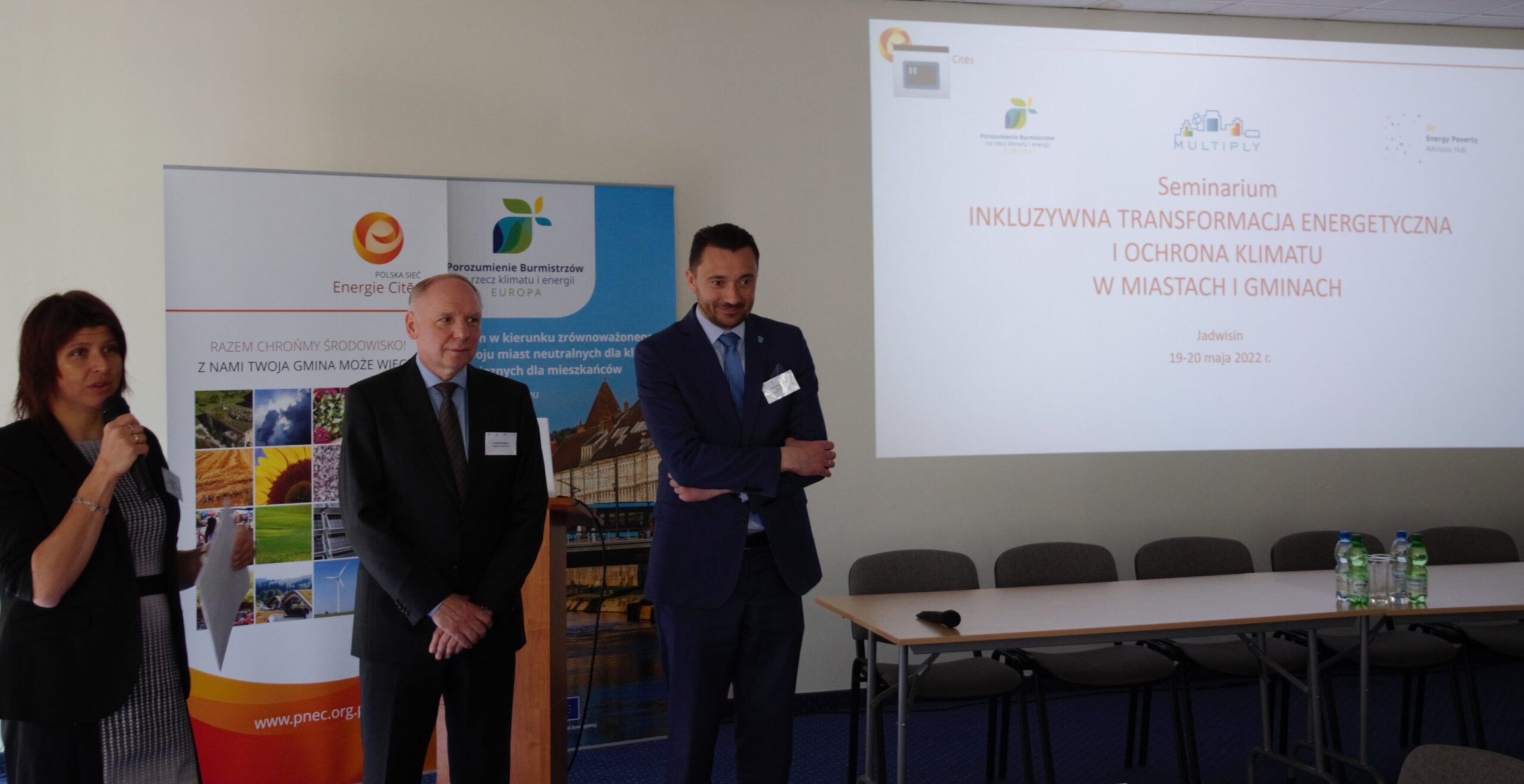
During the first day of the seminar, the meetings were opened by Mr. Artur Borkowski – the mayor of the City and Commune of Serock, and Mr. Leszek Drogosz – President of the Board of the Association of Municipalities Polish Network “Energie Cités” and director of the Infrastructure Office of the City of Warsaw. Of Warsaw, and then Mrs. Anna Jaskuła – director of the PNEC Association “Energie Cités” and started the first part of the seminar on sustainable city management in the context of new energy and social challenges.
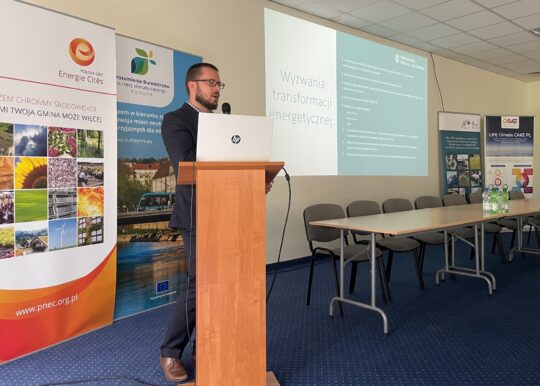
In the first part of the meeting, Mr. Paweł Różycki, Deputy Director of the Department of Strategy and Analyzes, Ministry of Climate and Environment, gave a presentation entitled “Poland’s climate and energy policy in the context of new energy, geopolitical and social challenges”, where he discussed the most important challenges related to the energy transformation and the pursuit of climate neutrality in Poland, as well as related to, inter alia, the current situation in the world and the limited availability of fuels on international markets, or high prices of fossil fuels. During his speech, he also presented the assumptions for updating the document “State energy policy 2040” (PEP 2040), where, apart from the existing pillars, I. Just transition, II. Zero-emission energy system, III. Good air quality, the new fourth pillar is to be “Energy Sovereignty”.
Ms Anna Czyżewska from the Department of Climate Change Adaptation, National Fund for Environmental Protection and Water Management (NFOŚiGW) showed a presentation entitled “Financing of tasks in the field of adaptation to climate change by the National Fund for Environmental Protection and Water Management”, where she presented the possibilities of financing activities from various programs, i.e. the priority program “Adaptation to climate change and reducing the effects of environmental threats”, or the priority program “Climate spas”, as well as the possibilities of financing activities from the Operational Program Infrastructure and Environment (OPI & E 2014-2021) where under Measure 2.1: “Adaptation to climate change along with securing and increasing resistance to natural disasters, in particular natural disasters and environmental monitoring”, a number of investments related to water management are implemented.
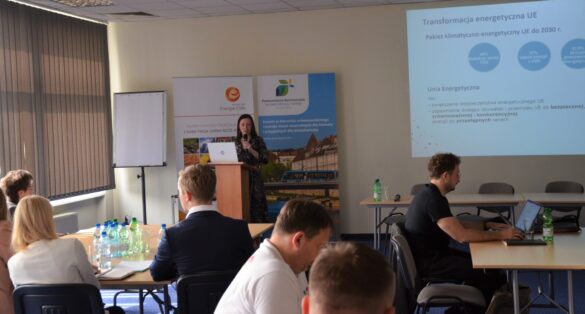
Ms Iwona Korohoda – Project Manager Association of Municipalities Polish Network “Energie Cités” gave a presentation entitled “Covenant of Mayors and support of European institutions for local governments – leaders of the energy transformation in Poland”, during which she discussed the Covenant of Mayors for climate and energy initiative and support of European institutions for local governments – in this regard. Ms Patrycja Płonka, Project Manager, Association of Municipalities Polish Network “Energie Cités” – presented a presentation entitled “Integrated city planning as a tool to reduce energy consumption and greenhouse gas emissions from the city (MULTIPLY project)”.
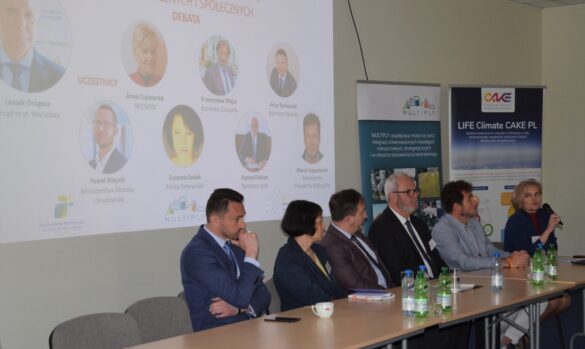
Representatives of local governments and cities participated in the debate on planning the future and development of cities and communes in the field of energy transformation and municipalities, as well as on behalf of the National Fund for Environmental Protection and Water Management and the Polish Green Network. The results of the talks emphasized that local governments face many energy challenges, and the transformation to low-emission, despite the support provided, is a huge burden due to the need to incur high own contribution (even with co-financing from NFEPWM programs), uncertainty related to new legal solutions and competition in the labor market.
In presentations of activities undertaken by local governments, Mr. Tomasz Skoczylas, director of the Urban Innovation Center – Urban Lab from the city of Rzeszów showed how to establish positive cooperation and involve citizens in cooperation with the city authorities, Mr. Tomasz Bońdos from the Bydgoszcz City Hall presented a systemic approach to optimization energy production and consumption in the city, and Mr. Bartosz Stachowiak from the Economic and Social Department of the UKSW showed what are the possibilities of using hydrogen in public and private transport.
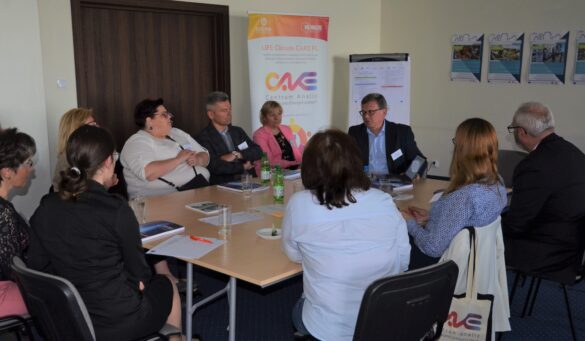 During the table session, the participants of the meeting had the opportunity to see the achievements of LIFE Climate CAKE PL, where Mr. Maciej Cygler, CAKE Expert presented a presentation entitled “Energy transformation of cities and municipalities”, during which he presented the results of CAKE’s work and the “Polska net – zero 2050. Podręcznik transformacji energetycznej dla Samorządów.” prepared as a result of our work. The session was very popular among the participants and gathered many representatives of local governments who welcomed the results of the work performed by CAKE. During this session, participants also had the opportunity to discuss and learn about the experiences of representatives from the business sector, including from PMG Sp. z o.o. on sustainable transport in the city and Pomorska Grupa Konsultingowa S.A. on actions taken for sustainable energy management, as well as on the legal conditions for establishing energy cooperatives in Poland.
During the table session, the participants of the meeting had the opportunity to see the achievements of LIFE Climate CAKE PL, where Mr. Maciej Cygler, CAKE Expert presented a presentation entitled “Energy transformation of cities and municipalities”, during which he presented the results of CAKE’s work and the “Polska net – zero 2050. Podręcznik transformacji energetycznej dla Samorządów.” prepared as a result of our work. The session was very popular among the participants and gathered many representatives of local governments who welcomed the results of the work performed by CAKE. During this session, participants also had the opportunity to discuss and learn about the experiences of representatives from the business sector, including from PMG Sp. z o.o. on sustainable transport in the city and Pomorska Grupa Konsultingowa S.A. on actions taken for sustainable energy management, as well as on the legal conditions for establishing energy cooperatives in Poland.
During the second day of the seminar, presentations were given and topics related to counteracting energy poverty were discussed. Ms Patrycja Płonka, the Energy Cities gave a presentation entitled “The role of local governments in the protection of vulnerable consumers and shaping conscious energy attitudes”, and Mr. Jakub Sokołowski (IBS) gave a presentation on “Diagonosis of the problem of energy poverty in the commune”, and Mrs. Anna Fijas from the Energy Cities Association on “From diagnosis to action – tools at the disposal of local governments and examples of good practice “. Mr. Piotr Sołtysek from Bielsko-Biała talked about shaping active civic attitudes and involving residents in the implementation of local climate and energy goals. During the table session, Mr. Jerzy Tymczyszyn from Raciechowice informed about the role of eco-managers and activities aimed at involving residents in the implementation of local climate policy. Ms. Eliza Bujalska, the mayor of Mińsk Mazowiecki shared her experiences from the Human Smart City project, and Mr. Przemysław Major, the mayor of Cieszyn, talked about social consultations on the development of the city, conducted under the slogan “Let’s talk about Cieszyn”.
During the two-day seminar, CAKE experts, apart from participating in the seminar and discussions with a number of local government representatives, informed about the results of work and activities undertaken by our CAKE Team in the field of energy transformation, which could be useful in the work of local governments, and had the opportunity to provide representatives of local authorities with a number of publications and brochures made as part of our LIFE Climate CAKE PL project.
More information and a full report can be found on the PNEC website: http://www.pnec.org.pl/pl/3-aktualnoci-kat/859-inklusivena-transformacja-energetyczna-seminarium-w-jadwisinie-2022

 Reset ustawień
Reset ustawień Kontrast
Kontrast Widok
Widok Czytelność
Czytelność Czcionka
Czcionka Znaki
Znaki Interlinia
Interlinia Słowa
Słowa Akapity
Akapity Deklaracja dostępności
Deklaracja dostępności




